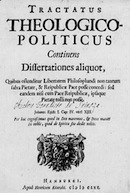
Source: Theologico-Political Treatise - Chapter II. of Prophets
Spinoza's Chapter 2. - the prophets are not to be trusted in matters of the intellect (Page 2)
 The products of the imagination cannot be trusted therefore the words of the prophets do not provide certainty. Prophetic knowledge may reveal moral truths but it is inferior to natural knowledge which is derived through reason. .
The products of the imagination cannot be trusted therefore the words of the prophets do not provide certainty. Prophetic knowledge may reveal moral truths but it is inferior to natural knowledge which is derived through reason. .
Spinoza goes on to analyze each prophet as to his temperament, background and eloquence and how those qualities influenced his teachings. He illustrates the diverse and sometimes contradictory opinions of the prophets and finds that "we not at all bound to trust them in matters of intellect."
As an example of errors in the Bible Spinoza uses the story Joshua's battle to point out that the authors of that portion thought that the earth was the fixed center of the universe and the sun revolved around it. Other errors are cited such as Adam physically hiding from an omniscient deity, Moses' conception of (Deus sive Natura) as a deity who had to descend from heaven to meet him at a mountain top and not as an omnipresent deity.
In his rational examination of the Bible Spinoza led the way to scholarly treatment of all sacred tents by generations of other workers. In his analysis, the early Israelites knew nothing about (Deus sive Natura) as is made evident by their worship of a god in the form of a golden calf. He goes on to say that those uncultivated, recently freed slaves could not be expected to have any advanced concepts of religion nor that Moses could have led them by the strength of rational thought. Rather Moses led not as a philosopher but as a lawgiver compelling them to moral behavior, making their new condition bondage rather than liberty and threatening them if they transgressed the commandments thus treating them as parents treat irrational children.
He goes on to discuss and analyze many other Biblical passages.
This is end of Chapter II.